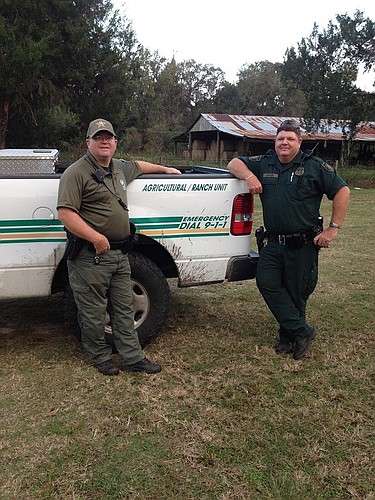- March 1, 2025

When people ask Danny Clifton what he does for living, he tells them he’s an “armed cow-catcher.”
That description usually get some looks, he says, until he explains that he’s a Volusia County Sheriff’s Deputy serving in the Agricultural Crimes Unit. “Catching cows” that have broken through fences is only part of his job, as he patrols the rural areas of the county.
His counterpart in Flagler County is Steve Williams, and the two work together often.
“Criminals don’t stop at the county line,” Williams said.
Williams is the only deputy covering Flagler County, while Clifton has a partner and a sergeant to cover the much-larger Volusia County.
Before Williams went full-time in the ag unit last January, re-establishing the county's agricultural officer position, he combined rural duties with regular patrolman tasks. And he thinks his presence has helped reduce the number of abused animals in the area.
“People know who to call,” Williams said. “They know someone is out here.”
In cases of animal neglect, Clifton said most problems can be solved with education. People don’t know what to feed large animals.
“They’re not like cats and dogs,” he said. “They would go to an animal shelter, but the people are not familiar with horses and cows.”
People also often can't afford to feed the horses, though deputies say that seems to be getting better with the economy. Clifton and Williams will help animal owners unable to properly care for animals find a rancher willing to take them in, or they'll help find a shelter.
In one case, people kept horses at their house and fed them with money sent by their owner, who had moved out of state. When the owner stopped sending money, Williams had to explain to the people that if a horse is on their property, they are responsible for it.
But it takes more than just checking an animal's weight to confirm neglect. A Holstein cow, for instance, shows its bones more than other cows, and a mother might be skinny right after giving birth.
“One guy told me he saw an underfed animal and he felt like punching the owner in the nose, but the animal wasn’t underweight,” Clifton said. “You have to know the type of animal.”
The duo uses the expertise of veterinarians quite often, as well, in cases of malnutrition or neglect. But in addition to training and third-party consultations, they also have a lifetime of knowledge on which to draw. Clifton was born and raised in West Volusia, and Williams is from Crescent City. Having rural backgrounds, they relate to the farmers and ranchers.
Williams said the ranchers wouldn’t trust anyone that is unfamiliar with livestock.
“(Ranchers) are the greatest people,” he said. “They know us and call us personally.”
Animals getting loose are a priority, because a 1,000 pound animal in the road can cause a deadly accident.
“In the spring a bull might go looking for a girlfriend,” Williams said.
He said if a person is neglectful even with their fence, they can be charged due to state requirements. But how do you get a 1,000-pound cow back in its pasture?
“Very carefully and with a lot of patience,” Williams said.
Clifton said they both carry a bucket of feed.
The deputies also handle any type of crime that is related to agriculture, such as theft of fuel or equipment, and trespassing.
They also patrol local parks.
“Volusia County has 33,000 acres of county parks,” Clifton said. “We patrol for hunting and trespassing.”
They also use their knowledge of the land to help firefighters get close to blazes. They know where to drive through pastures, and they have keys to unlock Florida Power & Light Co. gates, as well as private gates.
Clifton and Williams are also still full-time deputies and will enforce any law. If a call comes through about feeling suspect, they could drop stop-sticks to help apprehend him.
They also attend meetings once a month through the State Agricultural Crime Investigation Unit to stay up to date on policies and education.
“We learn body scoring, animal nutrition, how to read brands, animal cruelty laws," Williams said. "It’s an intelligence meeting on what is trending.”
And staying up to date is important; both men agree that the counties count on agriculture in big ways.
“It saved this area when the economy crashed,” Clifton said.